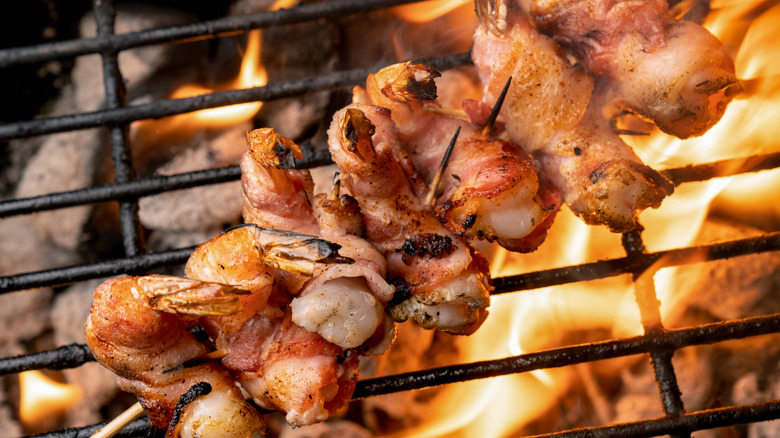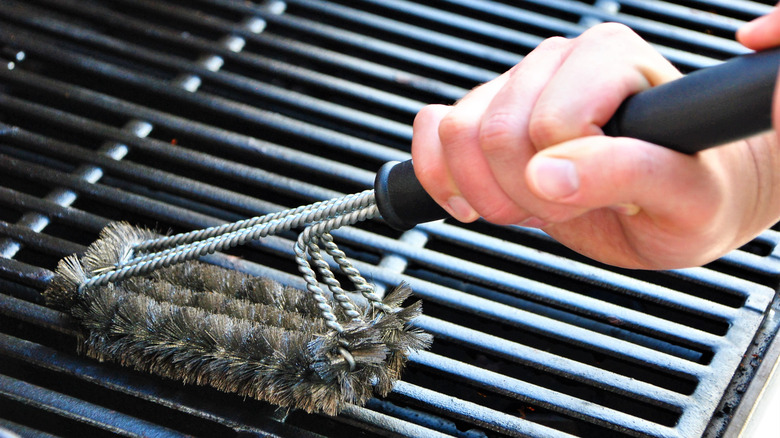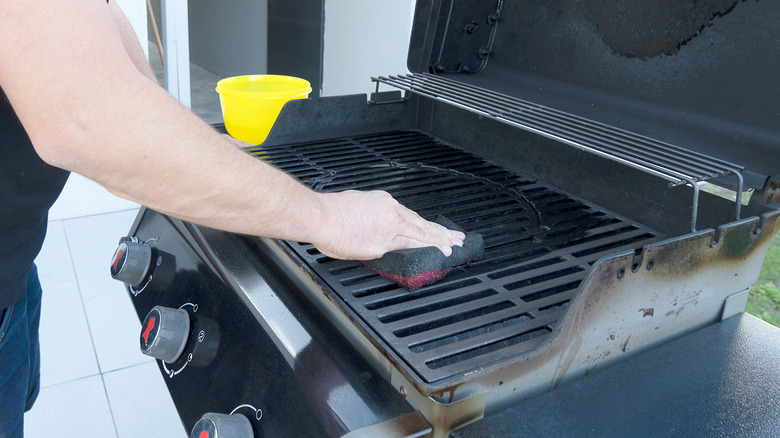Why You Should Be Cleaning Your Grill After Every Use
Nothing beats the grilled treats of smokey meat and crispy produce on warm evenings, but after all the cooking, you are too tired (and full of food) to worry about cleaning the grill. It sits there as you left it until the following use, and because one could easily assume that all the heat from the grill will kill off any bacteria lingering around, you don't give it a second thought. But the longer it sits with old dirt and grime clinging to it, the more likely mold is to form on your grill.
A dirty grill can impart flavors to your food that you want to avoid. Old, rancid oil will leave a nasty, bitter taste on your delicious grilled feast. And if you've been grilling steaks, some of that char build-up on the grill could be carcinogenic if ingested. If a grill is left soiled long enough, mold forms and, while mold isn't guaranteed to have negative effects, it can possibly make someone ill.
The heat will kill some of that mold, but the only way to know that your grill is uncontaminated is to tidy it up after each use. Grills are generally easier to clean when still warm, so the best time to spruce them up is right after use. How you clean your grill will depend on what kind of grill you have.
3 ways to clean your grill
Cleaning a charcoal grill can be messy, but it's not particularly difficult. When the coals are cool, empty the ashes in the basin. While the grate is still warm, scrape off any burnt-on char from both sides with a grill brush. This may require using a pot holder or heat-resistant glove to hold the grate. Once the grate is free of excess carbon, apply some oil to help protect it from rust.
For a gas grill, turn the grill on high to break up any grit clinging to the grates. After a few minutes, turn the heat off and let the grill cool a bit. Carefully clear away any stuck-on char with a metal scrub brush and oil the grates afterward. Make sure to inspect your grease trap to see if it needs to be emptied and wiped out. Left unchecked, it will accumulate grease, which can lead to a grease fire.
Straightening up a flat-top grill is fairly effortless because you don't have to worry about getting into the little nooks and crannies grates possess. While the grill is still warm, take a flat grill scraper and remove any burnt remains from the grill into the grease catcher. Wipe the griddle down with a towel and apply a light coat of oil to the entire surface. Turn the heat on for a few minutes with the oil applied. This will season the grill for your next cook. After completing these steps, empty the grease trap.
Give your grill a deeper clean periodically
It's important to clean after every use, but sometimes you might want to give it some extra attention. For flat-top grills, if there are still food particles glued to the grill after scraping, heat the grill until warm and spray a mixture of half vinegar and half water over the griddle. Use a stainless steel brush to scrub the mixture around the grill and break up any stuck-on food. Then rinse away any debris with more of the vinegar mixture. On gas grills, one area to be especially aware of is the burners. They can become easily clogged when grease and food particles get caught in the holes responsible for bringing the heat. Giving them a quick scrape with a grill brush occasionally will help prevent them from clogging.
Grilling can be a lot of work, and you don't want all your effort wasted on burnt-tasting food. Cleaning after every grill will keep that offensive flavor from combining with any of your delightful grilled fare, and you'll be able to rest easy as you start your next grill so that no mold will be lurking around that could potentially make someone sick. It's a little extra work after what has surely already been an eventful day, but giving your grill a little love before you knock off for the night will help you rest easy knowing it's ready to go for next time.


